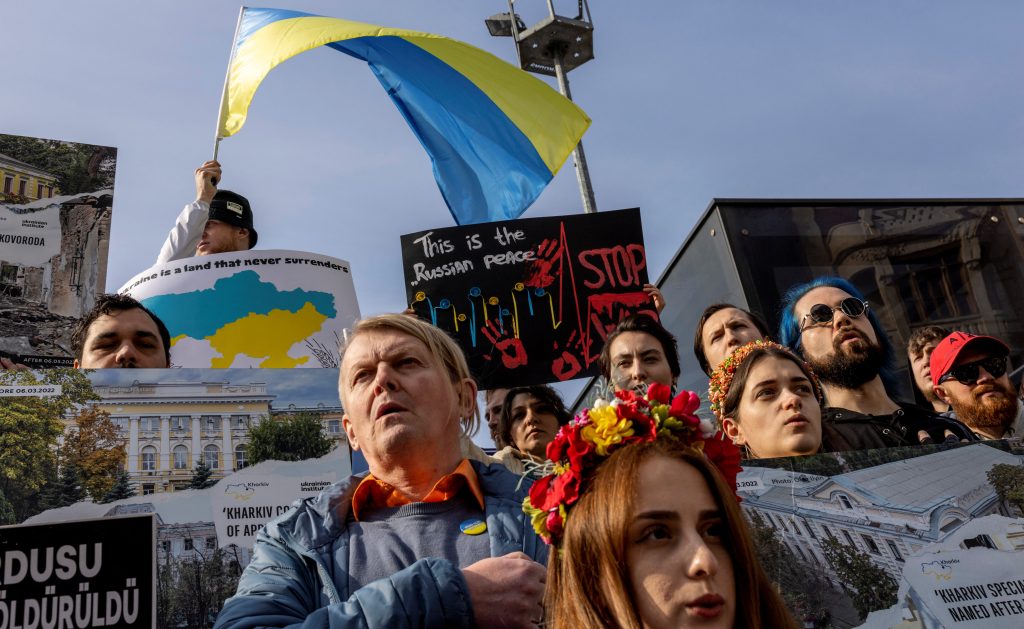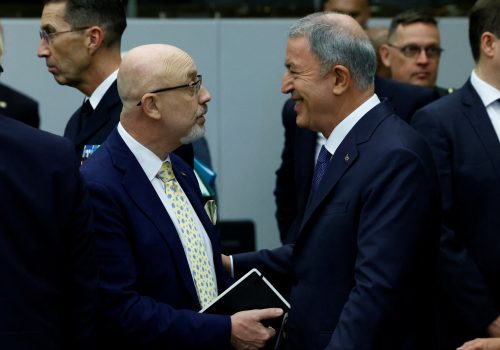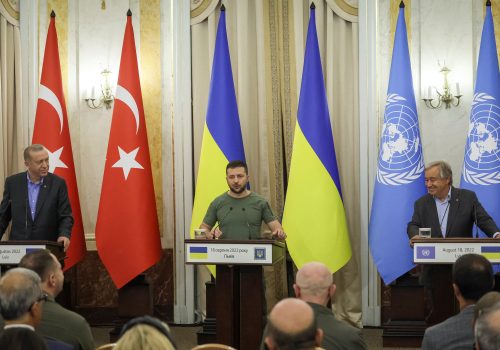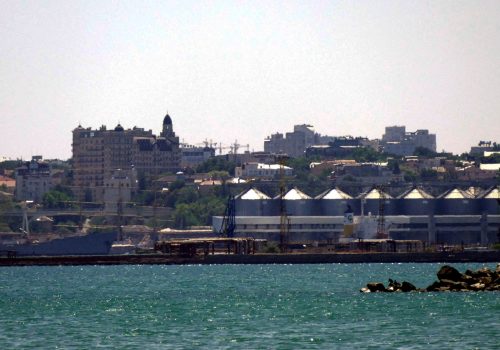As Russia gets increasingly weakened, Turkey faces a use-it-or-lose-it moment to show regional leadership and reengage with the West.
Since the start of Russia’s full-scale invasion of Ukraine, Turkey has opted for a delicate balancing act, which has appeared to be a risky but overall successful strategy. With interests that lie in both sides, Ankara has consistently supported Ukraine politically and militarily without alienating Russia economically.
Ukraine has played a crucial role in deterring the Kremlin’s military build-up in the Black Sea, which also poses a threat to Turkey. Thus, by supporting Ukraine, Turkey has been strengthening its own position in the region. At the same time, the Russian presence in Syria can also potentially create problems for Turkey by destabilizing the border areas and causing new refugee flows from Syria. Besides, Russia remains a major source of Turkey’s energy imports, economic benefits, and financial resources. These considerations have largely shaped Turkey’s desire to keep the channels for cooperation with Russia open.
However, a year after Moscow launched its full-scale invasion of Ukraine, the benefits of such a balancing act for Turkey have reached their limits. The country now needs a new regional strategy—a bold, ambitious, and clear-eyed one.
Early leadership
Though occasionally warned by the United States and Europe about the implications of burgeoning trade with an increasingly sanctioned Russia, Turkey has won praise from Ukraine and the West for its firm refusal to recognize the illegal annexation of Crimea and for its insistence on the territorial integrity of Ukraine in its 1991 borders.
Turkey was also the first country to provide Ukraine with combat drones when other partners were still hesitant about their military aid. Ankara’s decision to close the Bosphorus and Dardanelles straits for Russian warships also helped prevent escalation in the Black Sea.
At the same time, by maintaining close ties with “dear friend” Russian President Vladimir Putin, Turkish President Recep Tayyip Erdoğan, a skillful diplomat and seasoned politician, managed to position Turkey as a pivotal mediator in the conflict, highlighting successes of his balancing act. This personal relationship allowed him to bring the Russian leader to the negotiation table, albeit with little practical results for ending the war.
Turkey-brokered diplomatic deals, such as the grain initiative or prisoner swaps—including as recently as January—helped to solve pressing humanitarian issues, though Ankara has been unable to broker a ceasefire or comprehensive peace talks. Above all, Erdoğan’s peace-talking and food diplomacy has strengthened Turkey’s posture in, and far beyond, the region.
This strategy had its obvious advantages for Turkey in the first months of the full-scale invasion, before Russia’s military weakened significantly at the hands of Ukrainian forces, the evidence of mass Russian atrocities in Ukraine started to emerge, and all hope for a peaceful resolution crumbled. The situation has dramatically changed ever since, but Turkey’s regional policy hasn’t.
A need for course correction
Turkish Bayraktar TB2 drones had helped Ukraine in the early days of the war. However, with other allies stepping up their military support to Ukraine and rallying around Kyiv in coalitions to send tanks and advocate for sending jets, Turkey’s role has been overshadowed.
According to Oryx, an open-source intelligence research group, Turkey has sent military supplies to Ukraine beyond combat and reconnaisance drones, but Ankara’s desire to keep its military assistance to Ukraine low-profile, due to sensitivities with Russia, has created a distorted image of Turkey’s stance in this war, leading to accusations that Ankara is fence-sitting.
Despite Turkey’s status as the second-largest NATO army and Ankara’s diplomatic ambitions of a global power, it is not Turkey but smaller countries such as Poland and the Baltic states that have been the most vocal in condemning Russian atrocities in Ukraine and have taken the lead in international coalitions to deter Russian aggression in the region.
Turkey’s economic cooperation with Russia has allowed it to find some short-term solutions, but left a long-lasting negative impact on the public perception of Turkey in Ukraine and the West. According to a recent poll by the New Europe Center, the level of distrust of Erdoğan among Ukrainians has leaped from 19.5 percent in 2021 to 46.6 percent in 2022. The absence of high-profile visits of Turkish leadership to Kyiv or to de-occupied territories of Ukraine during the war has added to this sentiment.
From a purely pragmatic point of view, some economists have warned that deepening links with a declining Russian economy could drag Turkey into an “economic disaster.” Though Russia-Turkey trade doubled between 2021 and 2022, reaching $68.1 billion, Turkey’s largest market remains the European Union (EU) with $196.4 billion in trade in 2022, making Ankara’s relations with the European partners a key priority.
Dim prospects for a negotiated peace
The prospects of a negotiated peace with Putin’s regime, which Turkey has been long pushing for, are now unlikelier than ever. Besides, Putin has bluntly violated most of his previous commitments to Erdoğan. For example, Russia bombed the Odesa seaport, undermining the grain deal struck in Istanbul just the day before. Ukrainian officials have expressed concerns that Russia has been using commercial ships to carry weapons through the Bosphorus Strait, which experts recognize as a clear violation of the Montreux Convention. The officials also accused Russia of creating an explosion at the Olenivka prison after having rejected Turkey’s offer to evacuate fighters who surrendered at the Azovstal plant in May—some of the fighters were among the dozens of Ukrainian prisoners of war killed in the blast. Moreover, Russia has been blocking the work of Turkey-brokered grain corridors and obstructing navigation in the Black Sea—to no reaction from Ankara.
Turkey has never shied away from playing hard when its interests are at stake or its regional ambitions are challenged. Russia’s occupation of the Black Sea is undermining not only Turkey’s efforts to ease the global food crisis but also the Montreux regime—which grants commercial ships unrestricted access to the Turkish straits.
The grain deal, which allowed some agricultural exports from Ukrainian seaports when no other options were available, was certainly a success in the early months of invasion. However, now it is in a semi-defunct state and has given Moscow a de facto veto over the freedom of navigation in the Black Sea, turning the sea into a “Russian lake”—something Erdoğan had warned about long ago. One year into the war, it is time to address the root cause of the problem—which is Russian control of maritime routes—instead of focusing on technicalities of how to keep the deal alive. “If Russia won’t respond to diplomacy, then it is time for NATO to put a meaningful defensive naval presence into the Black Sea to protect merchant traffic going to and from Ukrainian ports,” says Yörük Işık from the Bosphorus Observer. This would not only emphasize Turkey’s role as a key NATO member in the Black Sea but also help to address a bigger problem: maintaining freedom of navigation and easing the food crisis in the Global South.
Time for Turkey to demonstrate regional leadership
Turkey has already benefited from Russia’s major failures in Ukraine. It has started to squeeze Russia out of the South Caucasus and gradually replace it as a security partner of the Turkic republics in Central Asia.
The defeat of Russia and emergence of a strong Ukraine with a well-trained, modern army would help deter Russian presence in the Black Sea without expanding permanent NATO presence. This strategic shift would also tilt the military balance in Ankara’s favor in Syria and the Mediterranean, where Russia has also been Turkey’s strategic rival.
Moscow’s overall weakening grip over the Turkic world, “from the Adriatic to the Great Wall of China,” presents multiple opportunities for Turkey, which significantly exceed the benefits of situational—and highly risky—commercial deals with a declining Russian regime under Western sanctions. Unlike in the early 1990s, Ankara has now shifted the focus of its regional cooperation from broad Pan-Turkic ideas to pragmatic infrastructural and energy projects. Given the EU’s goal to bypass Russia in oil, gas, and transport corridors, Turkey’s regional activism would likely be welcomed by the EU and United States.
As the country continues to need substantial foreign investments and reconstruction aid in the wake of devastating earthquakes, it would be a good time for Turkey to mend ties with the West.
The ability to maintain momentum in a positive bilateral agenda with the United States, which was highlighted during US Secretary of State Antony Blinken’s recent visit to Turkey, will among other things depend on Turkey’s readiness to recognize Russia as the major security threat and to step up efforts to prevent exports of dual-use products that could be used by Russian defense industries. During Blinken’s visit, Turkey’s chief diplomat publicly confirmed Ankara’s intent to cooperate as such.
A year ago, Turkey had the strategic vision to provide Ukraine with lethal weapons when some other countries were limiting their support to humanitarian aid and helmets. Turkey’s early leadership, among other factors, helped prevent Kyiv’s defeat.
Now, it is time for Turkey to develop a strategic vision for the region after Ukraine’s victory—when, ideally, rather than meeting with Putin, world leaders would watch him face trial for war crimes.
Yevgeniya Gaber is a nonresident senior fellow at the Atlantic Council IN TURKEY and at the Center in Modern Turkish Studies, Carleton University. Follow her on Twitter @GaberYevgeniya.
Further reading
Thu, Feb 23, 2023
Turkey’s support for Ukraine has been crucial and should continue, only stronger
TURKEYSource By
One year into the war, the Atlantic Council IN TURKEY discusses the role Turkey has played in the conflict and the importance of its continued support with Yevgeniya Gaber.
Fri, Sep 2, 2022
How Turkey can play a more constructive role in Russia’s war on Ukraine
TURKEYSource By Yevgeniya Gaber
For Ankara to create regional peace and stability, it must boost support to Kyiv rather than pressure it into compromise.
Mon, Jul 25, 2022
Grain drain: Why Turkey can’t afford to ignore Russian grain smuggling from Ukraine
TURKEYSource By Yevgeniya Gaber
The diplomatic goodwill Turkey won in its key role in the deal to unlock Ukrainian grain export is at risk as Russia may prove a spoiler.
Image: People attend a protest to mark the one-year anniversary of the Russian invasion of Ukraine, in Istanbul, Turkey, February 24, 2023. REUTERS/Umit Bektas



